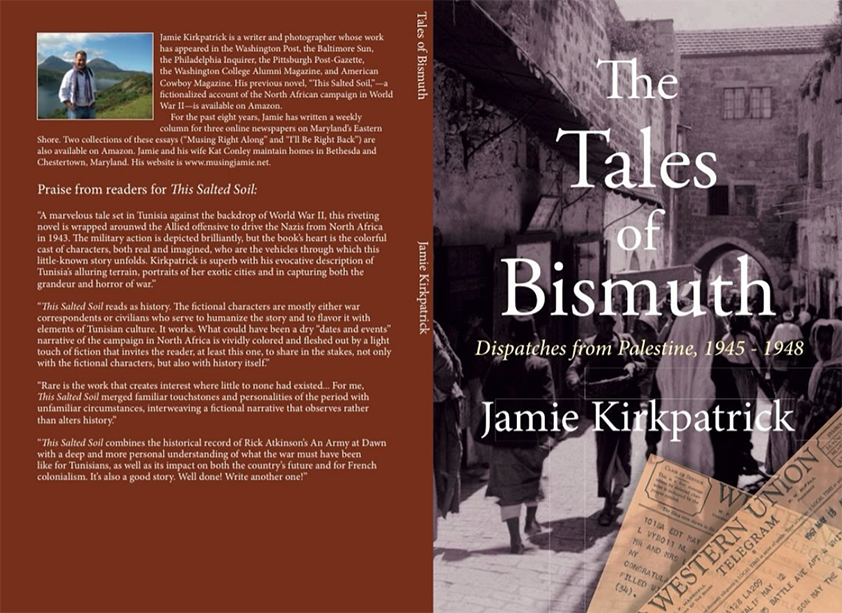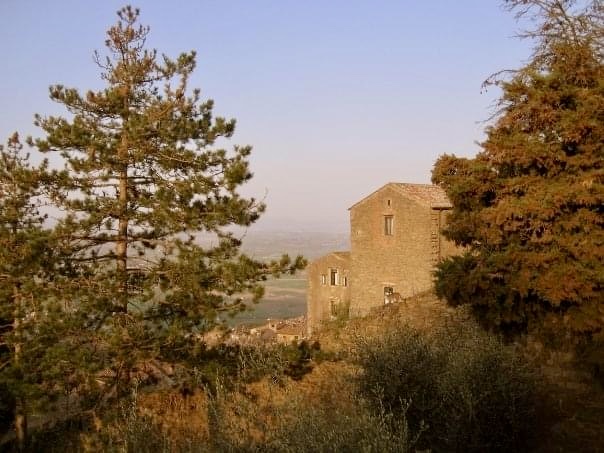 Just over a year ago, I decided to begin work on a sequel to my debut novel, “This Salted Soil.” In that book, I introduced readers to a young Irish journalist named Declan Shaw. Shaw was based in Tunisia (where I served as a Peace Corps Volunteer more than fifty years ago!), and assigned to cover the Allied invasion of North Africa in 1942, America’s bloody entry into the European theater in World War II. For more than seven months, American and British forces engaged their German and Italian adversaries in the epic battle for Tunisia. Their victory in that conflict paved the way for the invasion of Sicily and, through the painful lessons learned in the deserts and mountains of Tunisia, eventually for the Allied landings in Normandy on D-Day.
Just over a year ago, I decided to begin work on a sequel to my debut novel, “This Salted Soil.” In that book, I introduced readers to a young Irish journalist named Declan Shaw. Shaw was based in Tunisia (where I served as a Peace Corps Volunteer more than fifty years ago!), and assigned to cover the Allied invasion of North Africa in 1942, America’s bloody entry into the European theater in World War II. For more than seven months, American and British forces engaged their German and Italian adversaries in the epic battle for Tunisia. Their victory in that conflict paved the way for the invasion of Sicily and, through the painful lessons learned in the deserts and mountains of Tunisia, eventually for the Allied landings in Normandy on D-Day.
But I didn’t want Declan Shaw’s story to end in Tunisia. I wanted to explore the next chapter in his journalistic life, and so I began to write a sequel novel, one in which I sent Shaw first to Hungary to cover the siege of Budapest, and then to Palestine to cover events unfolding there. Thus was born “The Tales of Bismuth,” my personal investigation into the origins of the Arab-Israeli conflict. Little did I know…
In the book, Shaw arrives in Palestine in the summer of 1945, during the waning days of the British Mandate. Upon his arrival, he encounters his old Tunisian friend Bismuth, aTunisian Jew who has recently immigrated to Palestine. With Bismuth’s help, Shaw begins to wind his way through the origins of this ancient and heart-breaking conflict. He explores Jerusalem and Palestine, travels to Petra and Amman, and in the process, he falls in love with a place and a person. His life will never be the same.
The novel ends in 1948 with the creation of the new state of Israel and the outbreak of the war Israelis call their War of Independence, and what Palestinians have come to call their “Nakba,” their catastrophe. The question lingers: how can two peoples who claim the same land ever peacefully coexist?
Last fall, within days of finishing my manuscript, Hamas fighters invaded Israel killing scores of innocent civilians and taking more than 300 people hostage. In response, Israel launched a massive invasion of Gaza, an act which has almost destroyed the infrastructure of that territory and resulted in more than 30,000 civilian deaths. And the battle rages on…
Not only does that battle rage on, but it inches the region closer and closer to a wider, deadlier conflict. The recent exchange between Israel and Iran only serves to underscore the potential for a new conflict that threatens to engulf the region and beyond. Armageddon—the “end of days”—is a biblical concept, but today it seems as real and as present as ever.
At one point in my novel, Declan Shaw, in one of his dispatches, writes that should we fail to understand what (was) happening in Palestine in the months leading up to May, 1948, we would do so at our own peril. Back when Declan “wrote” that dispatch, little did he know how prescient his words would become.
“The Tales of Bismuth” is both timely and readable history. It is twice-dedicated: first, to all the innocent victims of this ancient and excruciating conflict, and second, to the next generation of peacemakers, whoever and wherever you are.
“The Tales of Bismuth” is available in Kindle, paperback, and hardcover editions on Amazon.
I’ll be right back.
Jamie Kirkpatrick is a writer and photographer who lives in Chestertown. His work has appeared in the Washington Post, the Baltimore Sun, the Philadelphia Inquirer, the Pittsburgh Post-Gazette, the Washington College Alumni Magazine, and American Cowboy Magazine.
His debut novel, “This Salted Soil,” and a delightful children’s book, “The Ballad of Poochie McVay,” are available on Amazon. His new novel, “The Tales of Bismuth,” has just been released.



 Maybe it’s due to the fragility of our aging infrastructure made apparent by the tragic demise of the Francis Scott Key Bridge, or maybe it’s just some misplaced molecule wandering through my brain that is reminding me to learn more about the Seven Wonders of the Ancient World, but whatever the reason, I’ve woken the last few mornings thinking about the Colossus of Rhodes. Which, of course, leads me to consider Salvador Dali’s surreal depiction of that ancient monument, which in turn, steers me in the direction of Emma Lazarus’ poem, “The New Colossus,” which, as we all know, is inscribed upon the Statue of Liberty… I’m sorry; I didn’t mean to burden you with the strange meanderings of my own ancient grey matter. Welcome to my world.
Maybe it’s due to the fragility of our aging infrastructure made apparent by the tragic demise of the Francis Scott Key Bridge, or maybe it’s just some misplaced molecule wandering through my brain that is reminding me to learn more about the Seven Wonders of the Ancient World, but whatever the reason, I’ve woken the last few mornings thinking about the Colossus of Rhodes. Which, of course, leads me to consider Salvador Dali’s surreal depiction of that ancient monument, which in turn, steers me in the direction of Emma Lazarus’ poem, “The New Colossus,” which, as we all know, is inscribed upon the Statue of Liberty… I’m sorry; I didn’t mean to burden you with the strange meanderings of my own ancient grey matter. Welcome to my world.
 In heady anticipation of Ewan McGregor’s upcoming streaming adaptation, I am reading “A Gentleman in Moscow” by Amor Towles for the second time. But now, instead of gulping it down like a glass of my favorite rosé wine, I’m savoring it sip-by-sip, marveling at Mr. Towles’ unerringly delightful descriptions of the life and times of Count Alexander Rostov, an erudite aristocrat who thankfully managed to avoid all the firing squads of the Russian Revolution. Instead, in Towles’ novel, the Count is serving a life sentence in Moscow’s fabled Metropol Hotel, and oh what a life he leads there!
In heady anticipation of Ewan McGregor’s upcoming streaming adaptation, I am reading “A Gentleman in Moscow” by Amor Towles for the second time. But now, instead of gulping it down like a glass of my favorite rosé wine, I’m savoring it sip-by-sip, marveling at Mr. Towles’ unerringly delightful descriptions of the life and times of Count Alexander Rostov, an erudite aristocrat who thankfully managed to avoid all the firing squads of the Russian Revolution. Instead, in Towles’ novel, the Count is serving a life sentence in Moscow’s fabled Metropol Hotel, and oh what a life he leads there!  Sixteen years ago, Cortona, Italy…. On a cool but unmistakably spring morning, I rose early and wandered up one of the many hills in town. I sat on an old stone wall beside the locked door of the convent, closed my eyes, and turned my face toward the rising sun. Coming from inside, I could faintly hear the cloistered sisters singing—no, chanting—their first devotions of the day. All else was still. I remember there was a tabby cat on another nearby wall who seemed to hear the music, too. The nuns’ voices seemed to come from far away, maybe almost from heaven.
Sixteen years ago, Cortona, Italy…. On a cool but unmistakably spring morning, I rose early and wandered up one of the many hills in town. I sat on an old stone wall beside the locked door of the convent, closed my eyes, and turned my face toward the rising sun. Coming from inside, I could faintly hear the cloistered sisters singing—no, chanting—their first devotions of the day. All else was still. I remember there was a tabby cat on another nearby wall who seemed to hear the music, too. The nuns’ voices seemed to come from far away, maybe almost from heaven. Yet another dank and dreary pre-spring day, the kind of weather my Scottish forebearers would refer to as
Yet another dank and dreary pre-spring day, the kind of weather my Scottish forebearers would refer to as 


